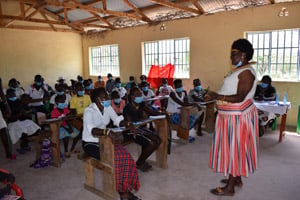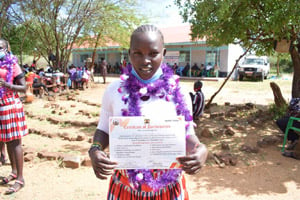
Daicy sat pensively in the training room. No one could fail to notice how her feelings alternated between excitement, disappointment and sadness. It was clear that she was experiencing an emotional roller coaster as she reckoned with the truth, reality and the falsehood that had been told to her since her childhood.
Daicy is 17 and in grade 11 at Chesta Secondary School in West Pokot County. She was among the 61 girls and 16 boys from Tikit Village who attended the first-ever Alternative Rite of Passage training in their village.
Daicy says, “My community holds traditional beliefs very dearly and girls like me are looked down upon. A majority of girls never transition from elementary school to high school. Were it not for the strictness of my Mum, I could be somebody’s wife by now.”
When she was about 13, her Grandmother reminded her that she was of age to undergo the customary Female Genital Mutilation (FGM). She almost gave in to her grandmother, but decided to approach her mother, who refused to allow her to undergo the rite of passage. Her mother wanted her to pursue an education and not think of getting married like her peers. Daicy performed well in Grade 8 and transitioned to high school.
World Vision Kenya recently began work in this area where the FGM prevalence rate is at 90% and child marriage rate is at 80%. World Vision organized this first-ever Alternative Rite of Passage training through the Kenya Big Dream project. This project ensures that boys and girls take an active role in influencing change in their communities.
“When the facilitator was teaching us on the dangers of FGM and its lasting effects on a woman’s body, I recalled what happened to my older sister,” Daicy says. “She succumbed to peer pressure and without my Mum’s knowledge. When she got married, she had problems giving birth and she almost died. Even now her body has lost control over passage of urine and stool,” she says.

She added, “Now I know why my sister suffers because of this useless old age tradition
which our community cherished so much. Thank God I never underwent it. And I will never allow it on my children.”
She learned of the myths that her culture perpetuates. Daicy says, “For me, I’m considered a girl, therefore I cannot make important decisions or participate in community events and no man from the community will marry me. These are falsehoods indoctrinated to us at an early age.” Daicy’s biggest learning was discovering who she is. The facilitators kept saying, “Self-esteem influences everything a person does in his or her life. It strengthens self-confidence and results in self-actualization.”
During graduation, Daicy expressed deep gratitude. “Thanks World Vision for making me realize that as a girl, I am first a child of God, a valuable member of the community and the world. Above all, I am answerable to myself first and not culture. FGM has no place in the modern world…” she says, displaying her ARP certificate for all to witness.







